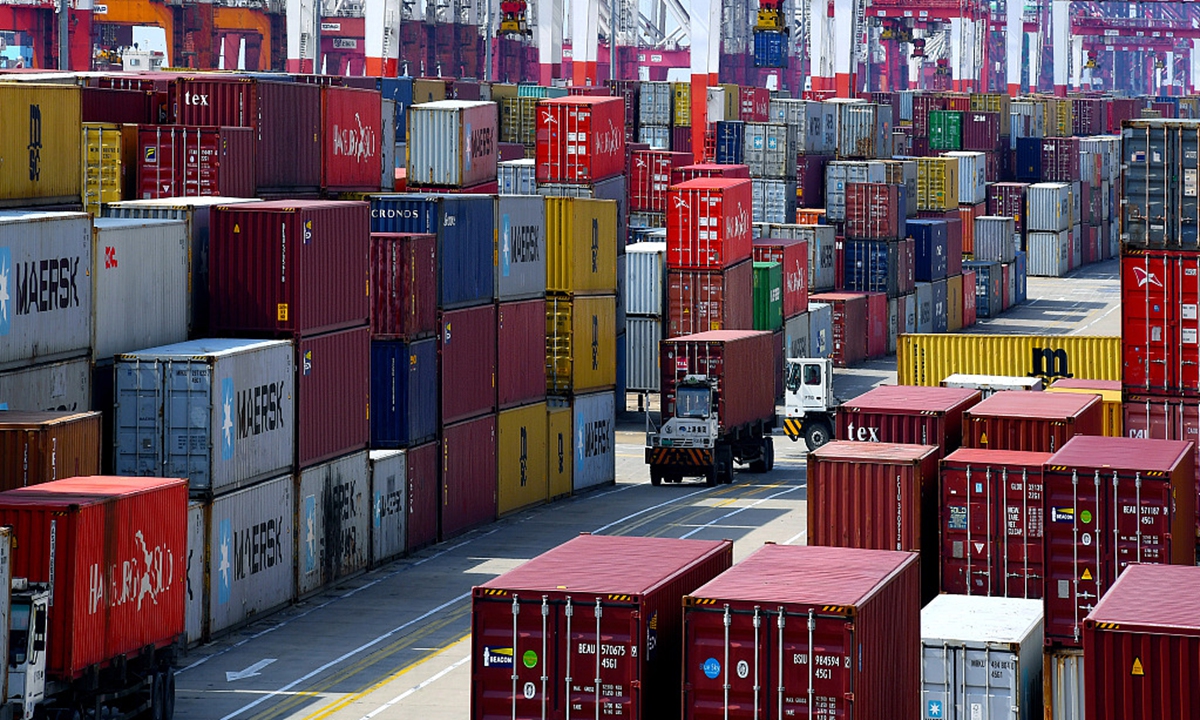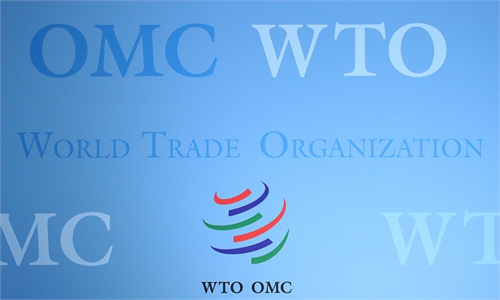Chinese experts urge US to take action after Yellen suggests lowering tariffs
Yellen’s remarks positive, but concrete actions needed: experts

foreign trade Photo:VCG
US Treasury Secretary Janet Yellen's comments on the US eventually lowering some tariffs on Chinese goods marks another positive sign in China-US trade ties and could be a significant step for the two countries to address one of their biggest and most damaging trade dispute: tariffs, Chinese analysts said on Monday.
However, analysts also pointed out US officials' lack of specific actions, despite their increasingly positive tone on trade issues, calling on US officials to follow through on their commitments and take concrete actions to roll back unilateral damaging trade policies under the previous US administration.
Yellen said "the US expected China to meet its commitments under the phase one trade deal signed under former president Donald Trump but could look at eventually lowering some tariffs in a reciprocal way" in an interview with Reuters published on Monday. Yellen said reducing tariffs will help address inflation woes in the US.
Her comments came against the backdrop of more frequent trade talks between senior officials in recent weeks and growing positive signs in bilateral trade ties.
US Trade Representative Katherine Tai said on October 28 at a meeting of the US National Chicken Council that her engagement with China is aimed at lowering the temperature of a trade relationship between the world's two largest economies that has become dangerously heated, Reuters reported.
These remarks followed two rounds of trade talks between Chinese and US senior officials in October, with Tai and Yellen both having talked with Chinese Vice Premier Liu He.
Chinese analysts following China-US trade ties pointed out that Yellen's remarks showed that the US might be beginning to accept the idea of reductions in tariffs, which China has repeatedly and persistently called for.
Gao Lingyun, an expert at the Chinese Academy of Social Sciences in Beijing, told the Global Times on Monday that remarks concerning tariffs by senior Biden administration officials have shown an interesting trend, in that the tariffs, traditionally chiefly a concern for the Chinese side, have now become a US concern as well.
Li Haidong, a professor at the Institute of International Relations of the China Foreign Affairs University, told the Global Times on Monday that Yellen's remarks again confirmed the fact that Washington's trade friction approach and unilaterally suppressing China could not solve the US' problems.
"Such an understanding comes from the fact that China-US trade and economic cooperation is win-win in nature," Li said.
Li said those remarks showed that the US has come to realize that it has to lift or lower the tariffs Trump placed on Chinese goods. "It is a positive advocacy for removing Trump's tariffs, which are roadblocks stalling China-US trade and economic cooperation," Li said.
Calls for removing tariffs echoed across the Pacific.
"Tariff relief by China also helped fuel American goods exports in many parts of the country. USCBC continues to advocate for both the US and China to draw down and permanently remove all of their respective tariffs," said Craig Allen, president of the US-China Business Council (USCBC), noting that China-US trade has real consequences for businesses, workers, and communities all across the country and in nearly every industry.
Most US Congressional districts' exports to China bounced back in 2020, following a record low in China-US trade in 2019 and the conclusion of the phase one deal in January 2020, a study by the USCBC showed on Monday.
Sixty-four percent of US Congressional districts exported more goods to China in 2020 compared with 2019, and 72 districts increased their exports by more than $100 million, the study showed. The uptick was particularly sharp in the farming communities of the Midwest, oil-exporting regions in Texas and Louisiana, and Oregon's semiconductor hub.
In October, Tai also talked about "a targeted tariff exclusion process" for exemptions from customs tariffs imposed on billions of dollars worth of Chinese goods by the Trump administration.
Growing signals from US officials for possible tariff reliefs also came amid disappointing economic data in the US. The US economy grew only at 2 percent in the third quarter in the wake of a Delta surge, US official data showed on Thursday. The growth rate shrank sharply from 6.7 percent in the second quarter, and Americans are facing empty shelves for the Christmas season due to the paralyzed supply chain and logistics disruptions.
Analysts said the frequent exchanges between senior officials and positive remarks pave the way for future interactions and are conducive to the yielding of better results.
Li said that Tai probably already had a blueprint on how tariff reductions were to be carried out and this plan could be announced this year.
Foreign Ministry spokesperson Wang Wenbin said at a regular press conference on Monday that restarting dialogue and avoiding confrontation are an important consensus reached in two phone conversations between top leaders in both countries, and he urged implementation from the US side so that political preparations are made for next-stage exchanges.
Tariff reductions are more likely to take place in sectors where US companies have a strong reliance on China or demand for Chinese products is particularly strong, analysts noted.
Gao said China has largely fulfilled its trade commitments, and predicted that the tariffs are more likely to be lowered based on an exclusion process.
"We have heard them talk the talk, now it is time to see if they can walk the walk," Gao said, noting that while the remarks made by US senior officials are positive, they also lack specifics.
China-US trade grew 35.4 percent year-on-year to $543 billion in the first nine months of 2021, Chinese customs statistics showed. The US was China's third-largest trade partner.

foreign trade Photo:VCG
US Treasury Secretary Janet Yellen's comments on the US eventually lowering some tariffs on Chinese goods marks another positive sign in China-US trade ties and could be a significant step for the two countries to address one of their biggest and most damaging trade dispute: tariffs, Chinese analysts said on Monday.
However, analysts also pointed out US officials' lack of specific actions, despite their increasingly positive tone on trade issues, calling on US officials to follow through on their commitments and take concrete actions to roll back unilateral damaging trade policies under the previous US administration.
Yellen said "the US expected China to meet its commitments under the phase one trade deal signed under former president Donald Trump but could look at eventually lowering some tariffs in a reciprocal way" in an interview with Reuters published on Monday. Yellen said reducing tariffs will help address inflation woes in the US.
Her comments came against the backdrop of more frequent trade talks between senior officials in recent weeks and growing positive signs in bilateral trade ties.
US Trade Representative Katherine Tai said on October 28 at a meeting of the US National Chicken Council that her engagement with China is aimed at lowering the temperature of a trade relationship between the world's two largest economies that has become dangerously heated, Reuters reported.
These remarks followed two rounds of trade talks between Chinese and US senior officials in October, with Tai and Yellen both having talked with Chinese Vice Premier Liu He.
Chinese analysts following China-US trade ties pointed out that Yellen's remarks showed that the US might be beginning to accept the idea of reductions in tariffs, which China has repeatedly and persistently called for.
Gao Lingyun, an expert at the Chinese Academy of Social Sciences in Beijing, told the Global Times on Monday that remarks concerning tariffs by senior Biden administration officials have shown an interesting trend, in that the tariffs, traditionally chiefly a concern for the Chinese side, have now become a US concern as well.
Li Haidong, a professor at the Institute of International Relations of the China Foreign Affairs University, told the Global Times on Monday that Yellen's remarks again confirmed the fact that Washington's trade friction approach and unilaterally suppressing China could not solve the US' problems.
"Such an understanding comes from the fact that China-US trade and economic cooperation is win-win in nature," Li said.
Li said those remarks showed that the US has come to realize that it has to lift or lower the tariffs Trump placed on Chinese goods. "It is a positive advocacy for removing Trump's tariffs, which are roadblocks stalling China-US trade and economic cooperation," Li said.
Calls for removing tariffs echoed across the Pacific.
"Tariff relief by China also helped fuel American goods exports in many parts of the country. USCBC continues to advocate for both the US and China to draw down and permanently remove all of their respective tariffs," said Craig Allen, president of the US-China Business Council (USCBC), noting that China-US trade has real consequences for businesses, workers, and communities all across the country and in nearly every industry.
Most US Congressional districts' exports to China bounced back in 2020, following a record low in China-US trade in 2019 and the conclusion of the phase one deal in January 2020, a study by the USCBC showed on Monday.
Sixty-four percent of US Congressional districts exported more goods to China in 2020 compared with 2019, and 72 districts increased their exports by more than $100 million, the study showed. The uptick was particularly sharp in the farming communities of the Midwest, oil-exporting regions in Texas and Louisiana, and Oregon's semiconductor hub.
In October, Tai also talked about "a targeted tariff exclusion process" for exemptions from customs tariffs imposed on billions of dollars worth of Chinese goods by the Trump administration.
Growing signals from US officials for possible tariff reliefs also came amid disappointing economic data in the US. The US economy grew only at 2 percent in the third quarter in the wake of a Delta surge, US official data showed on Thursday. The growth rate shrank sharply from 6.7 percent in the second quarter, and Americans are facing empty shelves for the Christmas season due to the paralyzed supply chain and logistics disruptions.
Analysts said the frequent exchanges between senior officials and positive remarks pave the way for future interactions and are conducive to the yielding of better results.
Li said that Tai probably already had a blueprint on how tariff reductions were to be carried out and this plan could be announced this year.
Foreign Ministry spokesperson Wang Wenbin said at a regular press conference on Monday that restarting dialogue and avoiding confrontation are an important consensus reached in two phone conversations between top leaders in both countries, and he urged implementation from the US side so that political preparations are made for next-stage exchanges.
Tariff reductions are more likely to take place in sectors where US companies have a strong reliance on China or demand for Chinese products is particularly strong, analysts noted.
Gao said China has largely fulfilled its trade commitments, and predicted that the tariffs are more likely to be lowered based on an exclusion process.
"We have heard them talk the talk, now it is time to see if they can walk the walk," Gao said, noting that while the remarks made by US senior officials are positive, they also lack specifics.
China-US trade grew 35.4 percent year-on-year to $543 billion in the first nine months of 2021, Chinese customs statistics showed. The US was China's third-largest trade partner.


